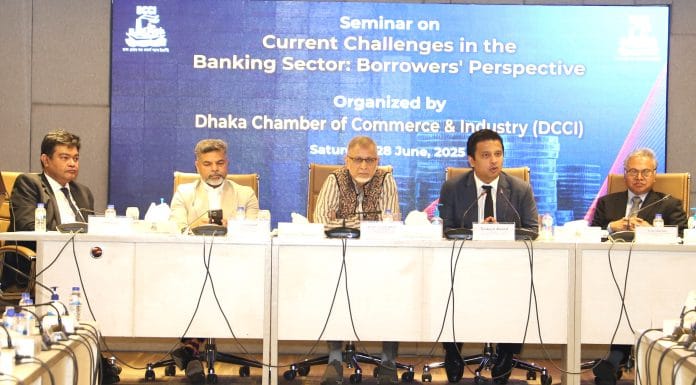The volume of non-performing loans (NPLs) in Bangladesh’s banking sector has surged to a staggering Tk 4.2 lakh crore (USD 35 billion) by mid-2025, accounting for over 24 percent of total outstanding loans—a development that threatens financial stability, undermines investor confidence, and squeezes credit access.
These alarming figures were revealed at a seminar titled “Current Challenges in the Banking Sector: Borrowers’ Perspective” hosted by the Dhaka Chamber of Commerce & Industry (DCCI) on Saturday at its auditorium in Motijheel.
In his keynote speech, DCCI President Taskeen Ahmed said the rising NPLs have created a crisis of confidence and reduced lending capacity, caused by poor governance, weak recovery mechanisms, and inadequate credit risk assessments. “Borrowers are facing a tighter credit environment, higher collateral requirements, and rising interest rates,” he said, calling for a coordinated policy response that aligns monetary tools with fiscal strategies to stimulate credit flow and support business recovery.
To help businesses avoid being unfairly categorized as defaulters, Taskeen proposed a six-month extension of the current loan classification timeline, enabling viable enterprises to pursue restructuring and revival plans.
Urgent Need for Policy Coordination
Special Assistant to the Chief Adviser (Economic Relations Division) Dr. Anisuzzaman Chowdhury emphasised the need for greater coordination between fiscal and monetary policy.
“If we do not protect the formal sector, the informal sector will also suffer,” he warned, suggesting that financially stable banks could consider lowering interest rates to support borrowers, especially small and medium enterprises (SMEs).
Widening Gap in Credit and Investment
Former DCCI President and Director Ashraf Ahmed highlighted a series of macroeconomic challenges facing the country: rising inflation, currency devaluation, import restrictions, and declining credit flow to the private sector.
He noted that interest rates have jumped from 9 percent to around 14 percent in 2025, forcing the private sector to bear an additional Tk1.39 trillion in interest payments.
Ahmed warned that continued growth in default loans would further restrict industrial credit, dampen investment, and erode private sector strength. He also pointed out that while 14 banks account for nearly 40 percent of NPLs, the remaining 47 banks show far better performance with just 5–7 percent NPLs, indicating the issue is not industry-wide but concentrated in specific institutions.
He recommended offering legal protection for loan restructuring and rescheduling efforts and stressed the need for structural reforms in banking governance and capital market development to ensure access to long-term financing.
Regulatory Reform and Transparency
Dr. Md. Ezazul Islam, Executive Director of the Monetary Policy Department at Bangladesh Bank, acknowledged that control of some banks by specific families post-2015 has caused governance concerns. However, he noted that following the recent political transition in July–August, confidence among borrowers is beginning to return as the central bank has moved to stabilize forex reserves and implement a market-based exchange rate.
Ezazul also admitted that fixing interest rates in the past was a mistake and should be left to market forces. He called on well-performing banks to consider marginal rate cuts and increase support for SMEs and social businesses.
Private Sector Voices Warn of Credit Crunch Risks
Hossain Khaled, Group Managing Director of Anwar Group and former DCCI President, noted that SMEs are essential to the economy, often linked to large enterprises through supply chains. “A crisis in large businesses will inevitably hit SMEs,” he said. Khaled called for a shift from the traditional bank-client model to a bank-client partnership, allowing banks to guide borrowers better and prevent further disruptions to production, employment, and investment.
Abdul Hai Sarker, Chairman of the Bangladesh Association of Banks, criticized the government’s weak recovery mechanisms and a shortage of financial courts, which slow the resolution of bad loans. He stressed better coordination between policymakers and implementing agencies to reduce NPLs and restore lender-borrower confidence.
Industry Leaders Seek Relief and Support
Fazle Shamim Ehsan, Executive President of BKMEA, expressed frustration that reliable borrowers are being overlooked while weak banks struggle with NPLs and strained central bank relations. He cited high exchange rates as another factor limiting credit expansion.
Mercantile Bank Managing Director Mati Ul Hasan proposed forming asset management companies under public-private partnership (PPP) to manage defaulted loans. He also warned that inadequate gas supply to industries is pushing many businesses toward default.
Sohana Rouf Chowdhury, Managing Director of Rangs Motors Ltd., said instability in the financial sector and high lending rates are threatening the sustainability of the manufacturing sector. She urged the government to consider low-cost funds for local entrepreneurs, especially those investing in electric vehicle (EV) production.
The seminar was attended by DCCI Senior Vice President Razeev H Chowdhury and Vice President Md. Salem Sulaiman, among others.

